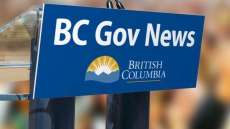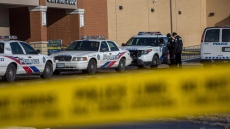OTTAWA — Natural Resources Minister Jim Carr says the government will not entertain any attempts by British Columbia to stall or stop the expansion of the Trans Mountain pipeline.
"If that is the goal of any province, we will take the necessary action to ensure that federally approved resource projects proceed." Carr said Monday.
When asked if that includes taking B.C. to court, he said Canada has "all kinds of options" to exert its constitutional authority over interprovincial pipelines.
Federal officials, ministers and Prime Minister Justin Trudeau have been negotiating with Alberta and B.C. for almost two weeks now, ever since B.C. launched a consultation asking its residents whether the province should ban any increase in oil flows through pipelines within the province pending further research on the impact of an oil spill.
Such a ban would kill the Trans Mountain pipeline expansion, which was given federal approval in November 2016 and would triple capacity of a line that already runs between Edmonton and Vancouver.
B.C. hasn't yet enacted such a ban, which limits the legal options for Ottawa to fight back.
"All British Columbia has tangibly done at this point is signal its intention to consult with the people of its province," said Carr.

Ottawa has constitutional jurisdiction over interprovincial infrastructure, such as highways, pipelines and electricity grids. Alberta wants the pipeline, but the B.C. NDP government elected last year campaigned on a promise to use "every tool in the toolbox" to fight it.
Alberta Premier Rachel Notley said Monday Ottawa has to persuade B.C. to take the threat to limit oil flows off the table.
"That is completely unconstitutional, it's a made-up authority, it's a made-up law, it's ridiculous," she said.
"That threat must be removed. We appreciate that the federal government gets the ridiculousness of it as much as we do, but sitting back and letting B.C. threaten it and not doing anything to tell them to pull back the threat and stop walking around being ridiculous, that's the key objective we're seeking."
In retaliation for B.C.'s threat to kill the pipeline, Notley cancelled talks to buy B.C. electricity and banned imports of B.C. wine into Alberta. She says the moves have helped get Ottawa's attention, there are more options Alberta can take and she believes Ottawa is working to find a solution.
"They know we're serious," Notley said.

Shannon Stubbs, federal Conservative natural resources critic, is not as convinced as Notley that Ottawa is doing everything it can to get the pipeline built. She introduced an opposition motion in the House of Commons on Monday calling on the federal government to make public no later than Feb. 15, its specific plan to get the pipeline built.
Stubbs said the Liberals keep saying the same thing over and over, that they approved the pipeline and that it will get built, but they are not putting any specifics on the table about how that will happen. She said it's incumbent on them to decide what those moves are, but said they should include defining "unnecessary delays" and what will be done to get B.C. to remove the threat to ban increased oil flows.
Carr called the Conservative motion an attempt to manufacture a crisis and stoke regional tensions.
Construction began on the Westridge Marine Terminal where the pipeline ends in Burnaby, B.C. in September 2017, but construction on the pipeline itself is still awaiting final permits and route approvals. Kinder Morgan recently said it expects the operational date for the pipeline is now a year later than expected, in December 2020. Officials have also said they are committed to the $7.4 billion project despite the latest stumbling blocks.




